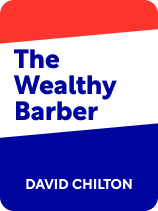

This article is an excerpt from the Shortform book guide to "The Wealthy Barber" by David Chilton. Shortform has the world's best summaries and analyses of books you should be reading.
Like this article? Sign up for a free trial here .
How is The Wealthy Barber different from other personal finance books? Who’s the barber, and what does he teach?
The Wealthy Barber by David Chilton is a bestselling guide to becoming financially successful by following a handful of simple, easy-to-understand principles. These principles are illustrated using a fictional story about a teacher, an auto plant worker, and a small business owner who seek financial guidance from a barber who’s become wealthy by following the lessons he imparts.
Here’s our overview of the book.
Overview of The Wealthy Barber by David Chilton
The Wealthy Barber by David Chilton is an introduction to basic principles of personal finance. These principles are illustrated by means of a fictional story about a teacher (Dave), an auto plant worker (Tom), and a small business owner (Cathy) who seek financial guidance from a local barber (Roy). Roy has become wealthy by following the lessons he imparts to them. Roy’s (and thus Chilton’s) primary message is that steady, “boring” investments over time are the best way to accumulate wealth.
The original version of The Wealthy Barber was published in 1989. The updated third edition of the book was released in April 2022. In this version, the setting of the fictional storyline has been moved from Canada to the US state of Michigan, among other changes. However, the financial numbers the book relies on are still very outdated (for example, the price of homes, the rates of return on investment, contribution caps for various retirement plans, and so on). Neither these outdated numbers nor the geographical setting is necessary to an understanding of the key principles.
During his barbershop lectures, Roy addresses concerns and misconceptions that Dave, Tom, and Cathy have about financial planning. For example, he explains:
- Why it makes sense for Tom to save 10% of his earnings and save for retirement, even though this will cut into his modest income
- Why Dave’s worries that he doesn’t have the knowledge or discipline to make good investments are unfounded
- Why it’s not true that by renting his apartment rather than buying a home, Tom is “throwing money away”
- Why Cathy should cancel her cash-value life insurance plan, even though she makes enough to afford it and it offers tax benefits
David Chilton is a Canadian author, investor, and television personality who holds a degree in economics from Wilfrid Laurier University. In 2011, Chilton released a second book in the wealthy barber series, called The Wealthy Barber Returns. This book covers many of the same topics as the original, but lacks the fictional barbershop narrative and addresses more recent developments in financial markets.After the initial descriptions of the characters and their backstories, each of the remaining chapters in The Wealthy Barber represents a financial lesson (or group of lessons) that the barber imparts to his patrons as he’s giving them their monthly haircuts.
(Shortform note: While he doesn’t say so explicitly, Chilton makes clear that his advice is geared toward those who have already achieved a degree of financial stability: His characters have decent jobs with good benefits, they aren’t in any significant debt, and they don’t seem to have any psychological hang-ups about money. Examples of personal finance books that address audiences with specific financial challenges include The Barefoot Investor, which offers advice on how to eliminate debt, and Your Money or Your Life, which helps readers understand their relationship with money as a first step to reaching financial independence.)
Part 1: Fundamentals of Financial Planning—If You Do Nothing Else, Do This
Chilton begins his barbershop lessons with some general financial advice: Time is one of the most important factors in achieving financial success. How do you ensure that time is on your side when it comes to financial planning? First, start early. Starting to apply basic financial planning principles when you’re young can make all the difference in how much wealth you accumulate. (And of course, if you can’t start early, start now!) Second, be patient. If you invest your money for the long run (decades, rather than years), you’re likely to see much greater returns on your investment.
Invest 10% of Your Income for Long-Term Growth
The most important step you can take if you want to become financially successful is to invest 10% of your income for long-term growth. This means taking 10% off the top of your paycheck as soon as you get paid (before you have a chance to spend it!). Chilton says you should invest that money in index funds or mutual funds, then leave it alone so it has a chance to grow by virtue of what some have called “the most powerful force in the universe”—compound interest.
Mutual Funds
A mutual fund is a professionally managed pool of many people’s money, which is invested in an array of stocks, bonds, and other assets. Individuals own shares in that portfolio. Chilton advises that you put your 10% savings in equity-oriented mutual funds and offers tips on how to choose one.
Index Funds
Index funds have two main advantages over mutual funds. One, they are cheaper than mutual funds, because they don’t require active management. Two, they generally perform better than mutual funds over time. Mutual fund managers try to beat the market, which is very hard to do; with index funds, you’ll at least match the market’s performance.
Real Estate
Besides investing in equity mutual funds or index funds, another good way to invest your 10% savings is by purchasing real estate. For the most part, Chilton says, real estate prices rise consistently over time. However, Chilton doesn’t advise buying real estate until you’ve first built up some assets. Many young people aren’t in good enough financial shape to qualify for a loan on a down payment, so when you’re starting out it’s best to confine your investments to mutual funds for a while.
Contribute to a Retirement Plan
In addition to investing 10% of your income for long-term growth, you should also be saving for retirement. According to Chilton, if you don’t save for retirement during your working years, you probably won’t have enough money to survive on during your retirement years.
401(k) Plan
Chilton recommends a 401(k) retirement plan as the best choice for most Americans. (A similar option for teachers is the 403(b) plan.) In a 401(k) plan, your employer matches your contributions up to a certain amount every year, pre-tax. The law sets a limit on how much you can contribute to a 401(k) plan, but this cap is indexed to inflation, so it increases on a yearly basis. Employer matching may be as close as you can get to free money.
Individual Retirement Account (IRA)
To contribute to an IRA, you must have earned income. As with a 401(k), there is a maximum contribution amount. Your contributions are likely tax-deductible, depending on your income and on whether you or your spouse is covered by any other type of retirement plan.
Roth IRA
With a Roth IRA, your contributions are not tax-deductible, but withdrawals during retirement are tax-free. In other words, the main difference between a Roth IRA and a traditional IRA is the timing of the tax advantage.
Keogh Plan
A Keogh plan is a type of retirement plan for people who are self-employed, either part time or full time. Like a traditional IRA, contributions to a Keogh plan are tax-deductible and growth within the plan is tax-deferred. You can contribute more to a Keogh plan than you can to an IRA; how much depends on which type of Keogh plan you choose.
Part 2: How to Save Even More Money
As you move through life, you’ll be faced with a series of financial decisions: things like whether to buy a home or rent, whether to pay for a vacation with credit or save up for it, and how to pay for your child’s college education. When it comes to these choices, surprisingly enough, there’s no wrong answer—but there are ways to increase the odds that you’ll accumulate more money as you go.
Buy a Home Only If It Makes Sense for You
Buying a home increases your assets and lowers your taxes. For most people, homeownership is an excellent investment. But Chilton points out that you should only buy a home if it’s right for you.
Disadvantages of Homeownership
Among the disadvantages of homeownership is the fact that homeowners have to pay for things like property taxes, insurance, utilities, upkeep, and home improvements—and they also have to invest the time to stay on top of all of these things. In addition, Chilton notes that many homeowners never benefit from their home’s increase in value over time because they never sell their home. In other words, they never get a return on their investment.
Advantages of Homeownership
While there are disadvantages to homeownership (and advantages to renting), Chilton claims that there are also many advantages to homeownership. First and foremost, your home is an asset that you can borrow against or, if it increases in value over the years, you can sell for a profit. Plus, there are tax advantages to owning a home.
Minimize Your Tax Bill
Chilton’s recommendation for minimizing your tax bill is to make investments such as homeownership and retirement plans that provide tax breaks. Another way to maximize your deductions and minimize your bill is to hire a tax consultant.
Live Within Your Means
Besides homeownership and minimizing your tax bill, another way to save money is to live within your means. Chilton says that this doesn’t have to mean careful budgeting. If you implement big-picture financial planning, day-to-day spending choices like whether you buy coffee or order take-out don’t matter too much.
Save Up to Buy Big-Ticket Items
Don’t borrow excessively to buy big-ticket items like cars or expensive products. Instead, save up until you can afford them. The best way to do this is by taking a certain amount off the top of your paycheck every pay period and investing it in guaranteed products like CDs. You don’t want to invest it in riskier products like stocks because you know you’ll need it relatively soon and can’t afford to lose it.
“A Dollar Saved Is Two Dollars Earned”
It’s better to save money when making purchases than it is to earn the same amount in income, because your income is subject to taxes and deductions. As Chilton puts it, “a dollar saved is two dollars earned.”
Don’t Carry Credit Card Debt
It’s never a good idea to carry credit card debt. The interest rate on credit card debt is much higher than it is for standard consumer loans. If you can’t pay off your credit card balance, borrow from the bank—the interest rate will be much lower on the bank loan.
Understand Your Spending
Although it’s not necessary to budget meticulously, Chilton says it’s helpful to write down your monthly expenses periodically to see where your money’s going. That way, you’re not spending too much on the wrong thing, and you can make any adjustments that seem warranted.
Keep a Modest Emergency Fund
Chilton says that, contrary to some advice, you don’t need four to six months of income in an emergency fund, but it is a good idea to keep some money on hand for emergencies. This is especially true if you’re a homeowner—you never know when unforeseen expenses might crop up.
Use Excess Cash Wisely
If you have excess cash (for example, from an inheritance), Chilton says the best investment decision you can make is to pay off any debt with non-deductible interest, such as car loans and credit-card balances. Make sure you always pay off the debt with the highest interest rate first.
Save Money for Your Children’s College Fund
If you have kids, you may want to start saving for their college fund. There are many valid options for how to do so, but Chilton says a solid choice is making a monthly payment toward a mutual fund for your child, just as you do for yourself.
Part 3: Protect Yourself and Your Loved Ones
If you’re expending the time and effort to become financially successful, you’ll want to ensure that you and your loved ones are provided for in the event of loss. Make sure you have sufficient life, health, and disability insurance, and be sure to make a will.
Purchase Life Insurance, But Only If You Need It
Because the purpose of life insurance is to protect your dependents in the event of your death, Chilton advises against buying life insurance if you’re single and you don’t have kids. Even if you do have dependents, you still don’t need to buy life insurance if your “living estate” (your assets minus your liabilities) is sufficient to provide for your spouse and children, pay off your debts, and pay for funeral expenses.
Make Sure You Have Sufficient Health and Disability Insurance
Of course, in addition to taking care of your loved ones, you should also take care of yourself. Make sure you have sufficient health and disability insurance. Chilton says most employer group disability policies are inadequate, so you’ll probably need an individual policy.
Make a Will
Last but certainly not least (in fact, you should do so as early as possible), Chilton stresses that you should make a will. Why is it important to make a will? In the absence of a will or revocable living trust, the court will pay off the deceased’s debts, then divide what’s left according to strict state laws. The laws do not take into consideration the wishes of the deceased or the needs of their survivors. Nor do the laws take into account anyone who does not have the requisite legal relationship to the deceased, such as common-law spouses, business partners, or charitable organizations.
Exercise: Determine Your Path to Financial Success
When it comes to financial planning, Chilton emphasizes starting as early as you can, so you can take advantage of compound interest, dollar-cost averaging, tax deductions, and other methods for saving money and accumulating wealth. Consider where you are on your path to financial success, and what additional steps you want to take.
Describe where you are on the path to financial success. Are you just starting out? Do you have the fundamentals down, but feel you need to do more? Do you have a plan in place, but think it might be too heavy on certain types of investments?
In light of where you are on your financial journey, what additional steps do you want to take to achieve financial success (for example, saving for retirement, minimizing your taxes, making a will)?
How do you plan to implement those steps (for example, researching index funds, hiring a financial advisor, contributing to a Roth IRA, paying off your debts, and cutting up your credit cards)?

———End of Preview———
Like what you just read? Read the rest of the world's best book summary and analysis of David Chilton's "The Wealthy Barber" at Shortform .
Here's what you'll find in our full The Wealthy Barber summary :
- A guide to becoming financially successful by following simple principles
- Why you might not need to buy life insurance
- Why you should only buy a house if it’s right for you






